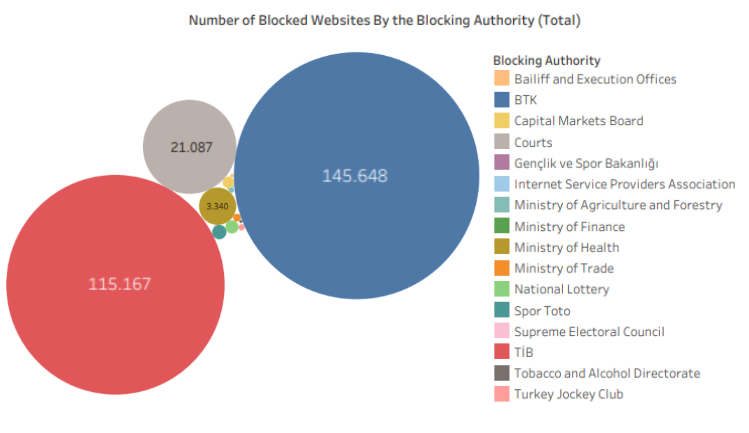Summary
The Freedom of Expression Association (İfade Özgürlüğü Derneği – IFÖD), led by Global Freedom of Expression expert Yaman Akdeniz, submitted a report in November 2019 to the UN Human Rights Council detailing the rise in online censorship in Turkey since the country’s preview Universal Period Review (UPR) in 2015.
 Turkey has seen an exponential rise in censorship and the number of websites blocked since 2015. This is due in part to the legal changes, enacted in the wake of the attempted coup in 2016, designed to cement the power of President Erdoğan. Article 8A of Law 5651 (passed in 2017) streamlines the process of censorship by government officials, ostensibly to “protect the right to life or security of life and property, national security and protection of public order, prevention of crimes or for the protection of public health.” However, research by IFÖD shows that this law in particular is used disproportionately to block access to left-wing and Kurdish news sites, journalists and activists, Wikipedia, and reports on military activity.
Turkey has seen an exponential rise in censorship and the number of websites blocked since 2015. This is due in part to the legal changes, enacted in the wake of the attempted coup in 2016, designed to cement the power of President Erdoğan. Article 8A of Law 5651 (passed in 2017) streamlines the process of censorship by government officials, ostensibly to “protect the right to life or security of life and property, national security and protection of public order, prevention of crimes or for the protection of public health.” However, research by IFÖD shows that this law in particular is used disproportionately to block access to left-wing and Kurdish news sites, journalists and activists, Wikipedia, and reports on military activity.
IFÖD also indicates that censorship is being used by Turkish authorities to curtail political discourse on Twitter. From 2012 to 2018, the number of removal requests submitted by Turkey dwarfs those from Russia and France, the countries with the second- and third-largest number of submissions, respectively. This is compounded by a legally inconsistent approach taken by the Constitutional Court, which views restrictions on the use of Twitter and YouTube to be a violation of free expression, but does not extend this view to Wikipedia. Furthermore, decisions by the Court are routinely ignored by the criminal judgeships of peace, which frequently approve requests by administrators.
Recommendations by IFÖD for the UPR process included enabling access to global platforms (Wikipedia), bringing internet censorship laws and practices in line with international and European standards, and limiting the scope of internet blocking capacity in order to protect free expression. The UPR national report focused primarily on the initiatives of the European Union and on Turkey’s respect of the foreign press. No mention was made of Turkish efforts to block access to local news organizations or to global information-sharing platforms.
